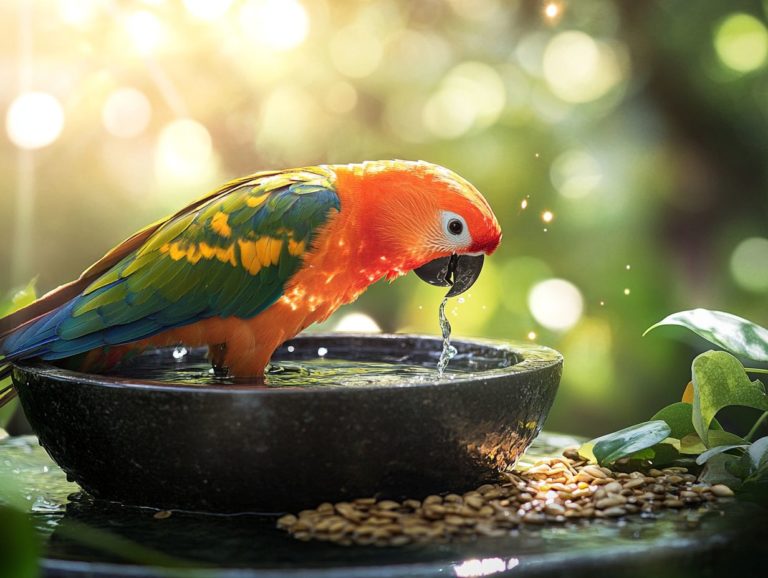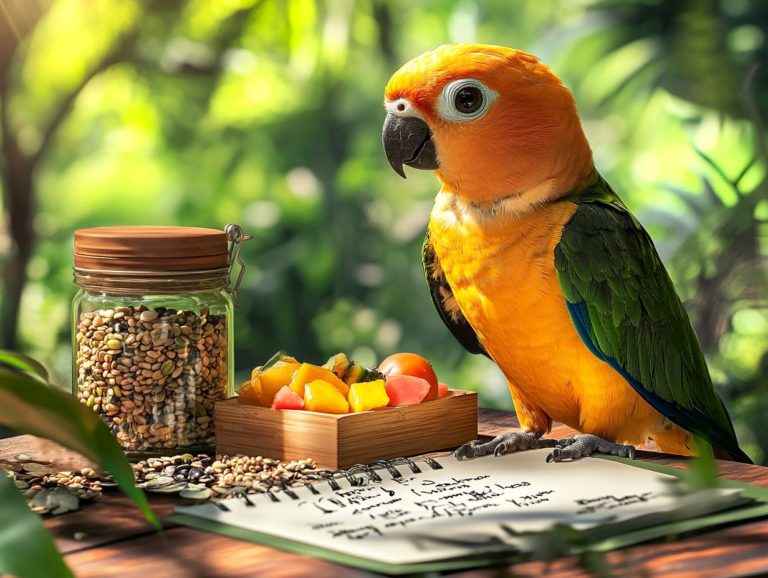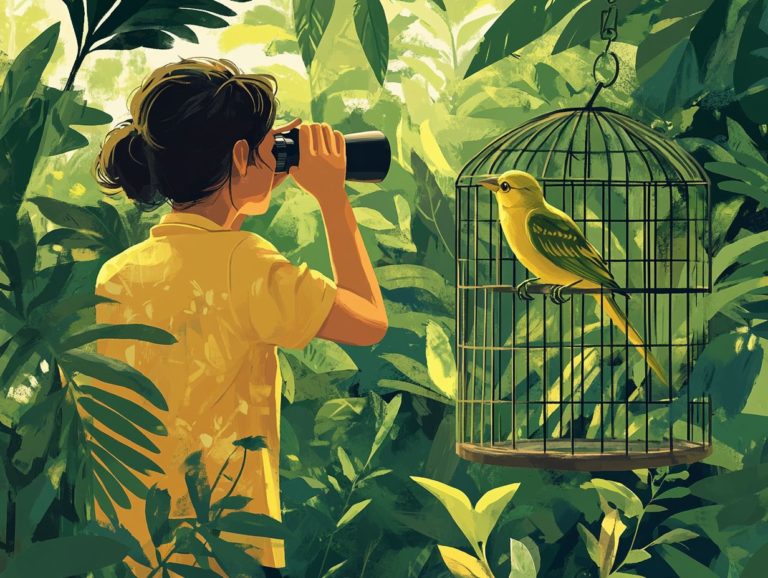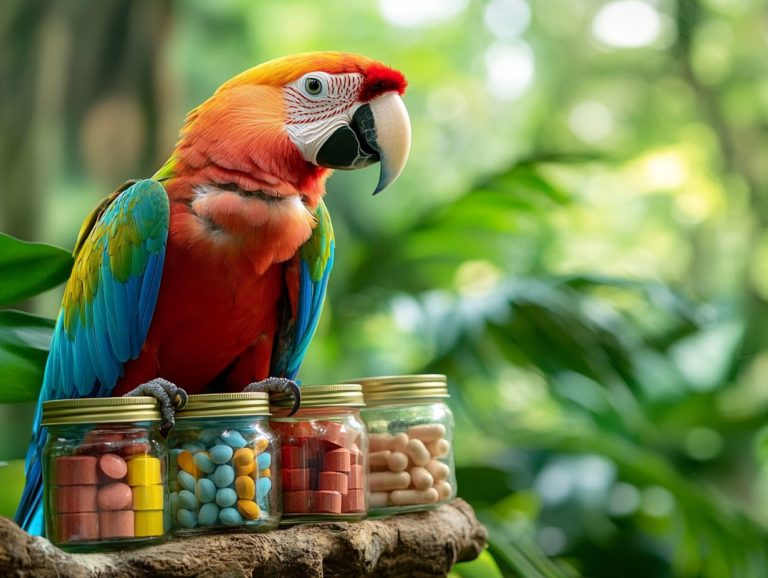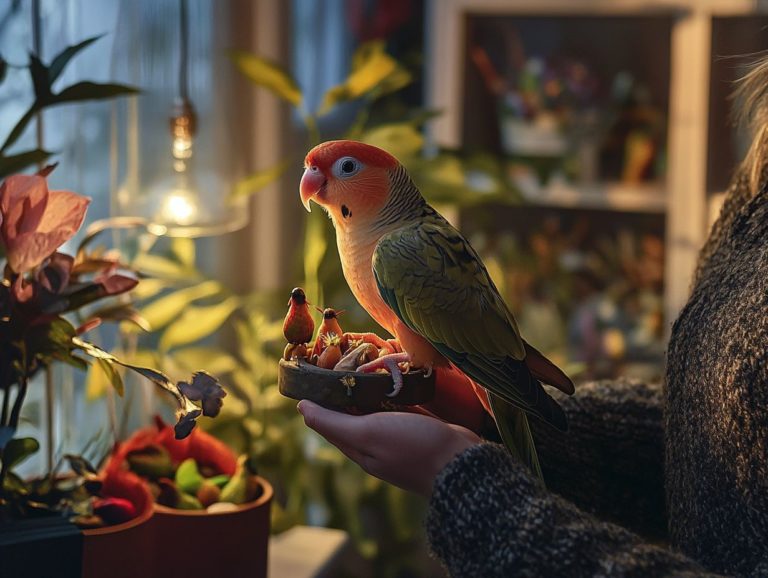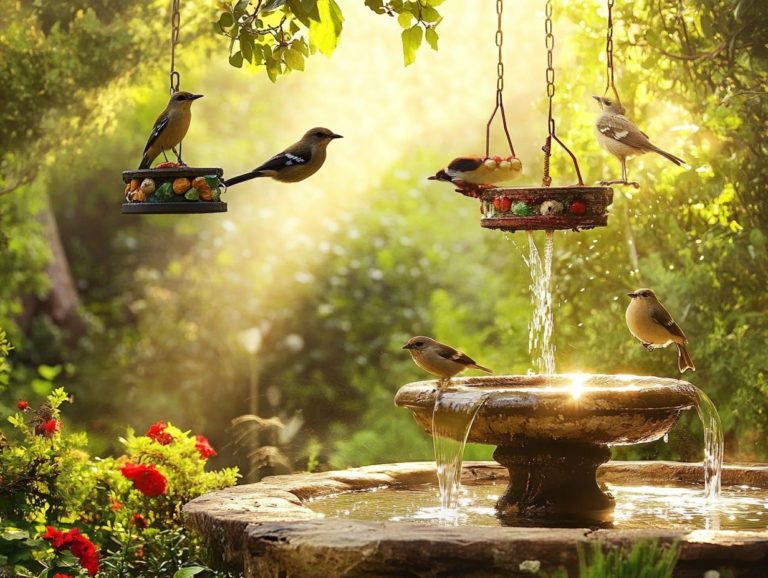How to Keep Your Pet Bird Engaged and Healthy
Owning a pet bird can truly be a rewarding journey, but it s crucial to grasp its unique needs for happiness and well-being.
From exploring various types of birds to crafting a stimulating environment filled with engaging toys and ample social interaction, there s a lot to consider.
Proper nutrition, regular veterinary check-ups, and grooming are vital for maintaining your feathered friend s health.
This guide will help you nurture a strong bond with your bird while ensuring its safety and security in your home.
Dive in to discover how to keep your pet bird engaged and thriving!
Contents
- Key Takeaways:
- Understanding Your Pet Bird’s Needs
- Creating a Stimulating Environment
- Proper Nutrition for Pet Birds
- Keeping Your Pet Bird Healthy
- Bonding with Your Pet Bird
- Ensuring a Safe and Secure Environment
- Frequently Asked Questions
- How can I keep my pet bird engaged and healthy?
- What are some ways to mentally stimulate my pet bird?
- What types of toys and activities should I provide for my pet bird?
- How often should I play with my pet bird?
- What should I do if my bird seems bored or disinterested?
- Are there any specific foods that can help promote my bird’s health and engagement?
Key Takeaways:
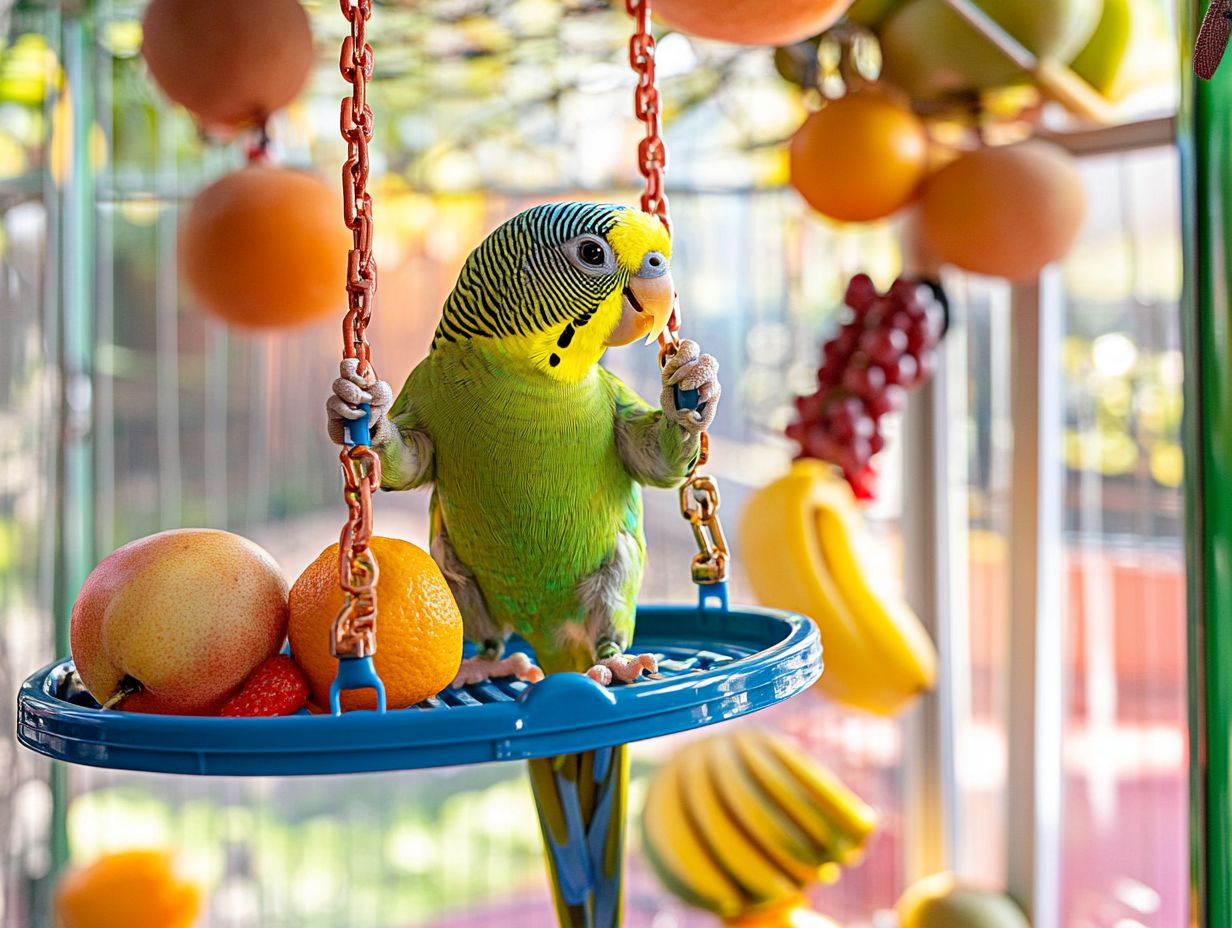
- Understand your pet bird’s unique needs to provide the best care and keep it healthy.
- Create a stimulating environment with toys and social interaction to keep your pet bird mentally engaged.
- Proper nutrition, regular vet check-ups, and bonding activities are key to maintaining your pet bird’s health and well-being.
Understanding Your Pet Bird’s Needs
Understanding your pet bird’s needs is essential for its overall well-being. Various species like parrots, budgies, cockatiels, and macaws come with distinct requirements that mirror their natural behaviors and habitats.
Key elements of bird health include emotional behavior, monitoring of health indicators, and customized care practices. By creating a routine that addresses these factors, you can cultivate a nurturing environment for your feathered companion, elevating its quality of life and happiness.
Types of Birds and Their Unique Needs
Each bird type, like parrots, budgies, cockatiels, and macaws, has unique needs that must be met for their health and happiness. Understanding these differences is essential since each species has specific dietary requirements that influence their energy levels, feather quality, and overall vitality.
For example, while parrots thrive on a varied diet of fruits, vegetables, and nuts, budgies may need more seeds and grains to stay healthy. Habitat elements like cage size, perch types, and fun activities are crucial in supporting their natural behaviors.
By observing these dietary and environmental preferences, you can create an enriching atmosphere that nurtures both the physical and psychological well-being of your feathered companions.
Creating a Stimulating Environment
Your pet bird will thrive in a fun and exciting environment! The right mix of toys, engaging activities, and social interaction can effectively prevent health issues, and incorporating preventative care tips for your pet bird can further enhance their well-being.
Your feathered friend thrives on mental and physical stimulation, making it vital to invest in their environment. Learn how to make your bird’s cage more interesting for their well-being.
Toys and Activities for Mental Stimulation
Offering a variety of toys and activities is essential for ensuring your pet bird’s mental stimulation. Check out the top 10 bird enrichment ideas for happy pets, as this greatly enhances its bird health and reduces behavioral issues.
Different bird species have unique preferences when it comes to toys. Larger parrots like macaws and amazons enjoy heavy-duty ropes, chews, and puzzle toys that challenge their intellect. Meanwhile, smaller birds like budgerigars and finches might prefer lighter, softer toys and foraging materials that spark their curiosity.
By incorporating toys that mimic natural behaviors like climbing, foraging (searching for food), and shredding you can enhance their instincts, promote exercise, and create a more enriching environment.
Focusing on interactive and socially engaging activities not only stimulates your bird mentally but also fosters a deeper bond between you and your feathered friend. Discovering the best enrichment activities for birds can elevate the experience of pet ownership even further.
Importance of Social Interaction
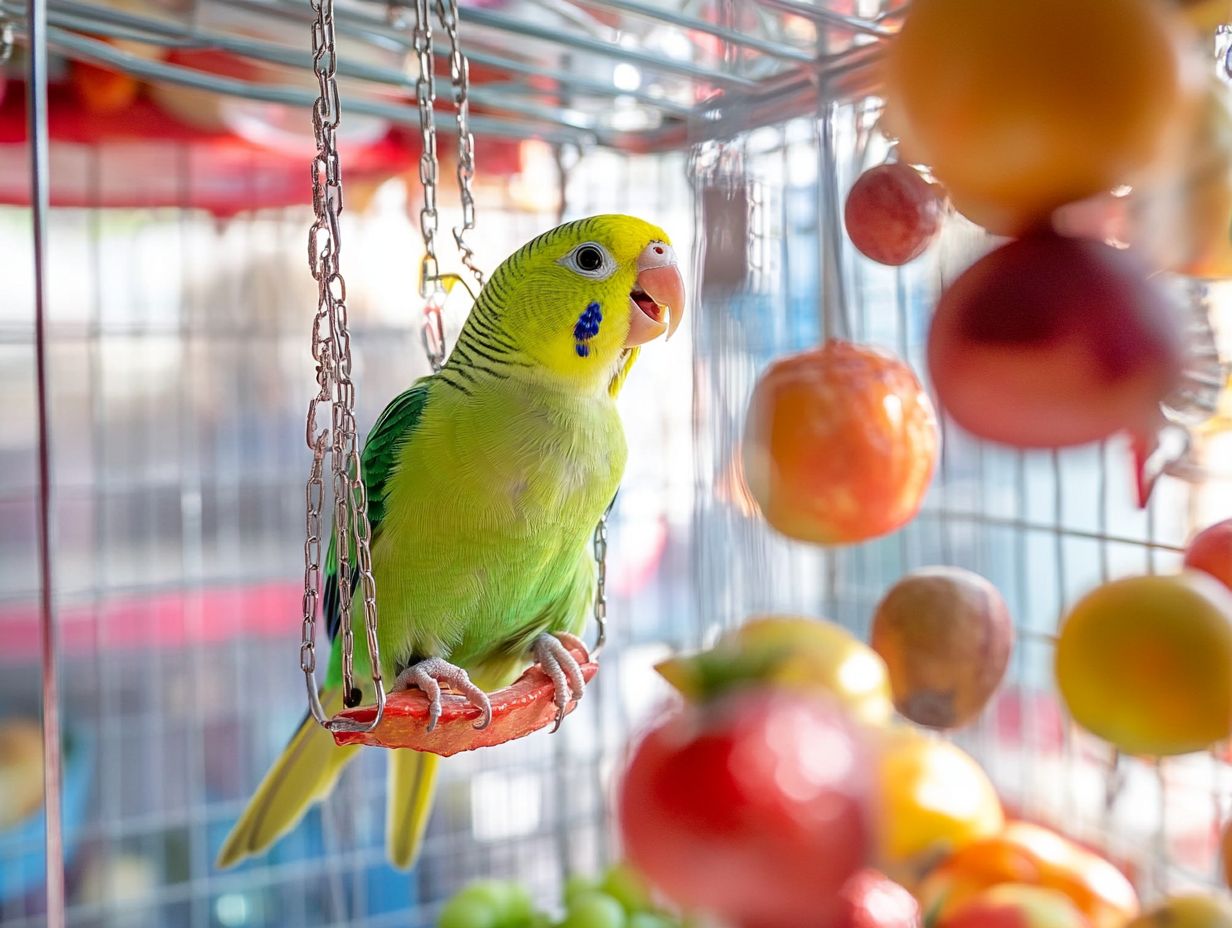
Social interaction is essential for your bird’s health. It enhances emotional well-being and provides a means to monitor health, helping to prevent common issues. To further improve their environment, consider learning how to make your bird’s cage more inviting.
Creating opportunities for interaction involves engaging in bonding activities like playtime, training sessions, or gentle conversations. These activities stimulate mental activity. If you have multiple birds, promoting natural social dynamics allows them to interact with one another.
Pay attention to changes in behavior during these interactions. They can serve as early warning signs for potential health problems. A sudden change in vocalizations, activity levels, or social engagement may indicate stress or illness. This prompts a closer look at your bird’s condition.
Fostering meaningful social environments lays the groundwork for your bird’s overall well-being.
Proper Nutrition for Pet Birds
Ensuring proper nutrition for your pet birds is paramount. A well-balanced diet rich in healthy food choices and essential staples profoundly influences their overall health and plays a crucial role in preventing diseases like psittacosis, a bird disease that affects their breathing.
Recommended Diet and Supplements
A well-rounded diet for your pet birds should encompass a delightful variety of seeds, pellets, fruits, and vegetables. Essential supplements should cater to their nutritional needs.
This holistic approach ensures that various bird species receive the vital vitamins and minerals necessary for optimal health. Larger parrots might thrive on high-fat seeds, while smaller birds often flourish with lighter ingredients. Incorporating fresh fruits like berries or bananas enhances their diet and provides hydration and essential micronutrients.
Introducing leafy greens such as spinach and kale adds vital fiber and calcium to their meals. Keep a close eye on their health to ensure they thrive. Consulting with an avian vet is wise whenever you introduce new foods or if any dietary concerns arise.
Keeping Your Pet Bird Healthy
Maintaining your pet bird’s health demands consistent care. Schedule regular veterinary check-ups, ensure proper grooming, and diligently monitor their well-being to avert common health issues.
Regular Vet Check-Ups and Grooming
Regular vet check-ups are essential for maintaining your bird’s health. Grooming serves as a vital tool for monitoring well-being and ensuring overall pet wellness.
These visits provide a golden opportunity for professionals to assess and diagnose potential issues. They also offer invaluable insights into preventive care specifically tailored for birds. During a check-up, expect a comprehensive examination where the vet evaluates your bird s weight, plumage, and overall behavior.
Grooming plays a crucial role as well. It allows you to check for signs of mites or infections while ensuring that feathers are kept in pristine condition. Incorporating regular scratching and bathing routines helps maintain feather quality and promotes better overall health and happiness for your feathered companion.
Common Health Issues and How to Address Them
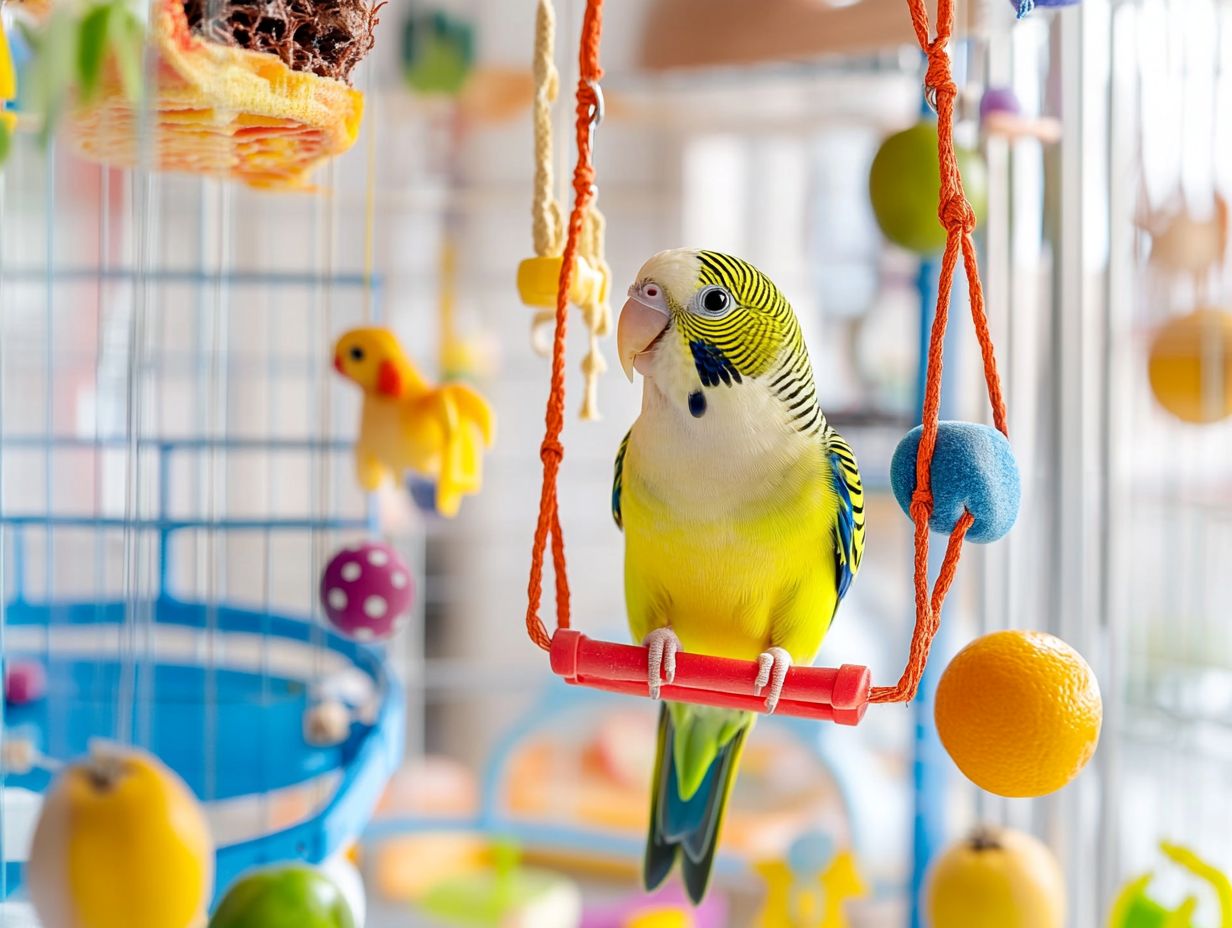
Act quickly on common health issues to keep your bird happy and healthy! Signs like psittacosis symptoms demand immediate attention from an avian vet to effectively monitor your bird’s health.
Other prevalent conditions, such as feather plucking, respiratory infections, and gastrointestinal problems, can significantly impact your bird’s well-being. Look out for symptoms like lethargy, changes in appetite, and unusual vocalizations; they often indicate something is not quite right.
Regular check-ups and vigilant observation of behavior are crucial for maintaining their health and catching potential problems early. Seeking veterinary advice aids in diagnosing these issues and offers guidance on preventive measures. Additionally, understanding the benefits of enrichment for bird health can significantly improve their quality of life. Focus on proper diet, environmental factors, and social interactions. These steps lead to a happier and healthier companion.
Consult with an avian vet or give your bird some extra love today!
Bonding with Your Pet Bird
Bonding with your pet bird is crucial for cultivating trust and improving its emotional well-being. This ultimately leads to a more rewarding relationship between you and your avian companion.
Building Trust and Strengthening Your Relationship
Building trust with your pet bird is a gradual journey that requires patience and positive interactions to truly enhance your relationship.
Take the time to engage in activities that your feathered companion enjoys, as this can significantly enrich your bond and help you recognize signs your bird needs more mental stimulation.
Positive reinforcement is very important rewarding them with treats or praise for good behavior nurtures a sense of security and appreciation in your presence.
Pay attention to how your bird moves and acts, as these cues can provide valuable insights into their feelings. For example, a relaxed bird may display a comfortable demeanor, while anxious behaviors might indicate they need a little extra reassurance from you.
Becoming an exercise partner for your bird can also help build that trust. Working together during playtime or training fosters connection and makes them feel more comfortable and open with you.
Ensuring a Safe and Secure Environment
It s vital to create a safe and secure environment for your pet bird to thrive! You should pay meticulous attention to the cleaning agents you use and be aware of the common myths that often surround bird care.
Preventing Accidents and Hazards
Preventing accidents and hazards in your bird’s environment is crucial for their safety and for reducing the risk of common health issues.
To create a secure living space, regularly inspect for potential threats, such as sharp objects, toxic plants, or loose cables that could pose a danger.
Making environmental adjustments, like providing adequate perch spacing, maintaining the right temperature, and ensuring proper ventilation, can significantly enhance your bird’s comfort and safety.
It’s also wise to monitor any changes in your bird’s behavior, appetite, or feather condition. This vigilance allows you to spot emerging issues before they escalate, ensuring a happy and healthy life for your feathered companion.
Frequently Asked Questions
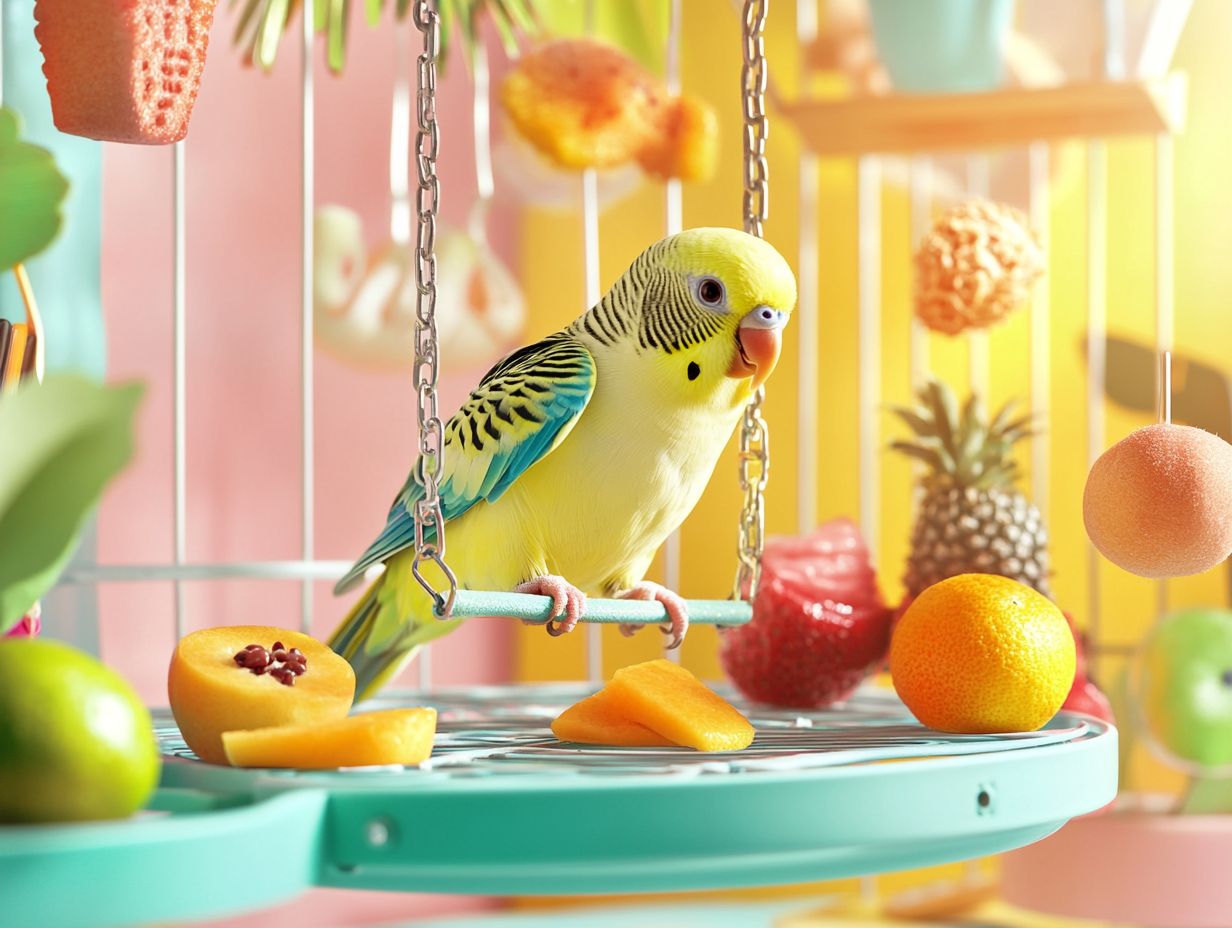
How can I keep my pet bird engaged and healthy?
To keep your pet bird engaged and healthy, it is important to provide mental and physical stimulation. This can be achieved through regular playtime and offering a variety of activities for maintaining a bird’s mental health for your bird to enjoy.
What are some ways to mentally stimulate my pet bird?
There are many ways to mentally stimulate your pet bird. You can teach them tricks, play games such as hide and seek, or even introduce new objects and textures for them to explore. For those interested in enhancing their pets’ well-being, following the lovebird lifestyle can ensure their happiness.
What types of toys and activities should I provide for my pet bird?
It is important to offer a variety of toys and activities for your pet bird. This can include puzzle toys, foraging toys, hanging toys, and even toys that encourage physical activity such as ladders or swings.
How often should I play with my pet bird?
It is recommended to spend at least 15-20 minutes of quality playtime with your pet bird each day. This will not only keep them engaged and entertained but also strengthen your bond with them.
What should I do if my bird seems bored or disinterested?
If your bird seems bored or disinterested, try introducing new toys or activities. You can also rotate their toys regularly to keep things interesting. If the behavior persists, it may be a sign of a larger issue, and it is best to consult a veterinarian.
Are there any specific foods that can help promote my bird’s health and engagement?
Yes, incorporating a variety of fresh fruits, vegetables, and seeds into your bird’s diet can help improve their overall health and provide mental stimulation. Just be sure to research which foods are safe and appropriate for your specific bird species.

